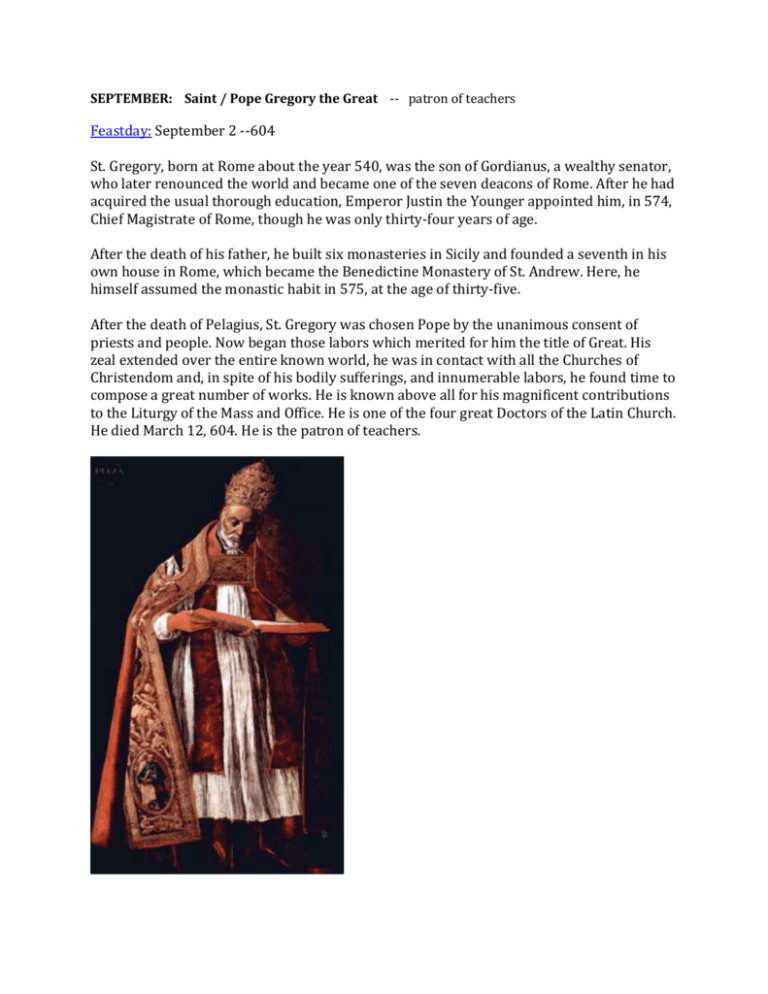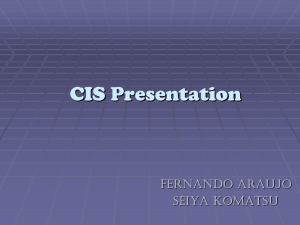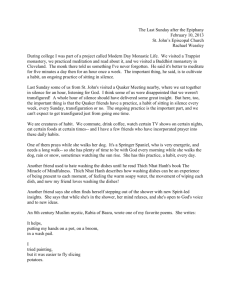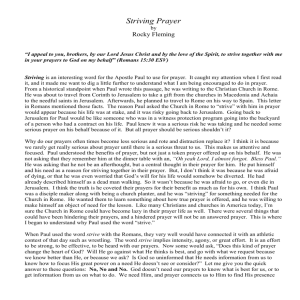SEPTEMBER: Saint / Pope Gregory the Great
advertisement

SEPTEMBER: Saint / Pope Gregory the Great -- patron of teachers Feastday: September 2 --604 St. Gregory, born at Rome about the year 540, was the son of Gordianus, a wealthy senator, who later renounced the world and became one of the seven deacons of Rome. After he had acquired the usual thorough education, Emperor Justin the Younger appointed him, in 574, Chief Magistrate of Rome, though he was only thirty-four years of age. After the death of his father, he built six monasteries in Sicily and founded a seventh in his own house in Rome, which became the Benedictine Monastery of St. Andrew. Here, he himself assumed the monastic habit in 575, at the age of thirty-five. After the death of Pelagius, St. Gregory was chosen Pope by the unanimous consent of priests and people. Now began those labors which merited for him the title of Great. His zeal extended over the entire known world, he was in contact with all the Churches of Christendom and, in spite of his bodily sufferings, and innumerable labors, he found time to compose a great number of works. He is known above all for his magnificent contributions to the Liturgy of the Mass and Office. He is one of the four great Doctors of the Latin Church. He died March 12, 604. He is the patron of teachers. September Virtue : Prayer An act of the virtue of religion which consists in asking proper gifts or graces from God Oportet semper oras et non deficere----We must always pray, and not faint.----Luke 18:1 Souls that have no habit of prayer are like a lame and paralytic body, which, though it has hands and feet, cannot use them. Therefore, to abandon prayer seems to me the same thing as to lose the straight road; for as prayer is the gate through which all the graces of God come to us, when this is closed, I do not know how we can have any.----St. Teresa Try to disengage yourself from so many cares, and take a little time to think of God and to rest in Him. Enter into the secret chamber of your heart, and banish from it everything save your Creator alone and what can help you to find Him; then having closed the door, say to Him, with all your soul: "Lord, I seek Thy Divine countenance----teach me to find it!"----St. Augustine ———— * Published by Encyclopedia Press, 1913. Prayer (Gk. euchesthai, to plead, to beg, to ask earnestly), By prayer we acknowledge God's power and goodness, and our own neediness and dependence. It is therefore an act of virtue implying the deepest reverence for God. Prayer indicates faith in God and hope in His goodness. The habit of prayer helps us in many ways. Besides obtaining the gifts and graces we need, the very process elevates our mind and heart to a knowledge and love of Divine things, and greater confidence in God. Indeed, so numerous and so helpful are the effects of prayer that even when prayers are not answered as we would like for them to be, we still receive the graces we need according to God’s love for us and His good plan for our lives. "Ask, and it shall be given you; seek, and you shall find: knock, and it shall be opened to you" (Matt., vii, 7); "Therefore I say unto you, all things whatsoever you ask when you pray, believe and you will receive" (Mark, xi, 24).










